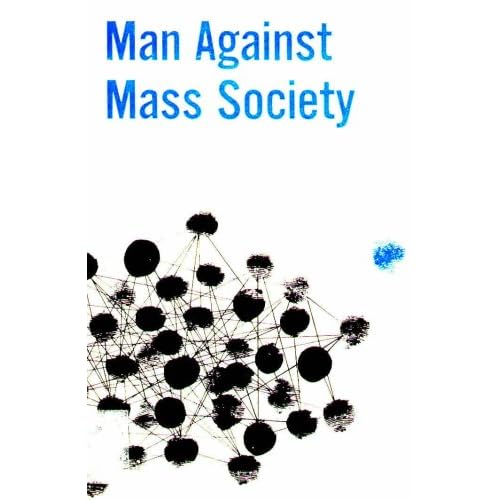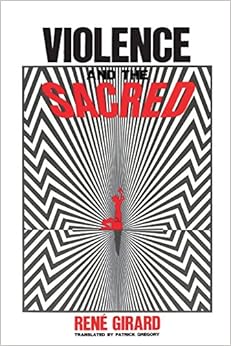
Posted on 11/15/2025 11:16:30 AM PST by CharlesOConnell
The story "The Man Who Wouldn't Join" (at the article link click) in consideration of Gabriel Marcel's "Man Against Mass Society", René Girard's notion of "the scapegoat mechanism" (violent mass psychology), Jacques Ellul's "Propaganda" (siloing of ideologies), and Edward Bernays' "Propaganda" (manipulative mass techniques).
The Man Who Wouldn't Join is about a rebellious individualist who attains security from invasive collective-movement recruitment demands by finding a similar, rebellious individualist woman who also "won't join" with whom he can ally in a marriage.
Our very belief in our individual political points of view is merely grist for the mill of oligarchic control, as if The Matrix did actually determine reality, except that unseen forces really do control everything and, their technicians of mind control having analyzed every intricate detail of our outlook, regardless of our being on the right or the left, our every thought and action is an element in a pre-determined script.

Whether or not we are planning on escaping into the country, whether or not we are preppers, mass manipulation of all our means is part of a highly articulated control system.
We think we are on one or another of opposite sides of an imaginary political spectrum, whereas it isn't left or right, it is high and low, the Soros-like forces on the very top controlling everything with with unimaginably long, highly intricate, articulated steel wires, a political Punch and Judy show to mesmerize the masses.
We may think that we have accepted restriction of freedom, an excessive reaction to the degradation of our civil life, with extra-legal state homicide against fishermen in the Carribean, being blasted to smithereens but, when a few survive, they are let go with no prosecutions for lack of cocaine or fentanyl evidence.

We may think, this is the inevitable result of Antifa in 2019 escaping prosecution for burning government buildings or trapping random drivers, beating in their windows, bloodying their heads and traumatizing their children, or if the drivers run over the anarchists, prosecuting the drivers but never touching the anarchists. We may think this is the unavoidable cost of civil chaos.

But this is actually a single, particular episode, the results of plans by forces like the Koch Brothers, just the current phase of a master-manipulation plan of immense duration, actually the U.S. Chamber of Commerce and the Business Roundtable, seeking to minimize bottom unskilled labor costs. When African-Americans, whose ancestors never volunteered to come here, were cut out of Hurricane Katrina recovery work 25 years ago in favor of endless legions of even lower-paid migrants from across the southern border, the Catholic Bishops who get $100 millions each year to dole out to poor people--keeping a handsome part for themselves--have no compassion for home-born Blacks who are more expensive to employ.
We have heard politicians from all past administrations spout off that they were going to get tough with undocumented migrants—in the first Trump administration, he was going to deport them all, but it never happened, and the number of undocumented migrants crossing the border actually increased. In each of the prior administrations, the Obama, Bush 43 and Clinton, there was endless tought talk but no action--because the very top of the pile, the Oligarchs, want it that way, so they can output the lowest cost in the bottom-skilled labor market.
So we are so wise as to think that, now that we had a Republican triple-plurality in the White House, the Senate and Congress, the people on the opposite side are never coming back. Wasn't that what we though during one of the Bush-43 administrations, when there was a similar super-majority? This was when people on the left burned Bush in effigy, but long before Bush threw Trump under the bus on January 6, 2021.
The people on the opposite side are not completely bereft of truth and justice. They have some honestly held principles, even if we regard as highly skewed, their overall resolution of who is owed justice, civil rights and consideration. They regard our opposite-number, our values, as out of proportion. But Soros just regards these chimeras, these eminations of penumbras, as phantoms in his playhouse of murder, rape and injustice.
What are the violent spasms of mass public opinion that Soros, Warren Buffett, Jamie Diamond and Larry Fink pay brainwashing specialists to manipulate? The shadow play, the drama of the Phantom of the Opera in the bowels of the Paris Opera, has been going on, demonstrably for at least a century, with Freud's nephew Edward Bernays in the late 1920s, but in reality for hundreds and thousands of years, if you can change your frame of reference to understand how it was done in the era of empires, kings, knights and emperors.
There is a coherent scheme for contrasting our topical story of the subversive individualism of the character Henry Westing in Thomas E. Purdom's story "The Man Who Wouldn't Sign Up" at https://www.gutenberg.org/cache/epub/72029/pg72029-images.html with Gabriel Marcel's "Man Against Mass Society", René Girard's violent mass psychology against the figure of the scapegoat, Jacques Ellul's notion of the siloing of opposed ideologies in "Propaganda", and the techniques of coercive mass manipulation in Edward Bernays' "Propaganda".
Henry Westing's Subversive Individualism (in "The Man Who Wouldn't Sign Up")

Westing as an archtypical character: In Thomas E. Purdom's story, Henry Westing is someone who consistently refuses to "sign up" for institutions or mass movements — fraternity, corporate work culture, ideologies. Throughout his life, people pressure him to belong: "You've got to belong … you've got to have something bigger than yourself." But Westing resists. He lives "in his own manner," with his own friends, his love of books, concerts, plays, and not by joining some mass cause.
Westing thus embodies a kind of subversive individualism: he is not a loner in the weak sense, but someone who deliberately rejects the group-identifying "sign-up" that others consider normative. He doesn't simply opt out of conformity — he quietly persists in his autonomy even as the mass society around him demands assimilation.
A few features of his individualism:
Refusal of Collective Identity: He doesn't want to merge his identity into a larger "something bigger" (fraternity, company, ideology).
Authenticity & Inner Life: He cherishes his inner life — friends, arts, love — not as means to something larger but as ends in themselves.
Silent Resistance: He doesn't violently rebel; he quietly lives differently.
Resilience: Despite social pressures (losing jobs, being criticized), he endures; his is not an escapist individualism, but one that stands his ground.
Gabriel Marcel, in Man Against Mass Society, diagnoses a metaphysical crisis in modernity: mass society degrades the "person" by reducing individuals to functional roles and abstract categories.

Themes include:
Spirit of Abstraction: Marcel criticizes a "spirit of abstraction" that turns people into objects, roles, or economic functions rather than real, living (mysterious) beings.
Barnes & Noble
Propaganda & Manipulation: He sees propaganda as a technique that deliberately manipulates the masses, and he condemns it as contemptuous of individual conscience: "every kind of propaganda implies a claim to have the right to manipulate other men's consciences."
Alienation & Loss of Mystery: In mass society, the metaphysical "mystery" of being (being as more than having) is lost. Marcel worries that technological society privileges having over being.
Personhood over the Mass: For Marcel, only a "person" (not a mere individual defined by role) is educable; the mass is degraded.
Contrast with Westing:
Westing's refusal to sign up aligns with Marcel's concern: he resists being reduced to a role or abstraction.
But Marcel's solution is not merely to opt out: Marcel wants a re-affirmation of "being" in relation to others, not a glorified sovereign self. Marcel's personalism emphasizes communion (relations), not isolation.
Westing's individualism is more self-contained; Marcel would likely caution that such solitude risks cutting off the ontological call (or "ontological exigency") that he thinks is essential to true personhood.
René Girard's Scapegoat Mechanism vs. Westing

Humans imitate each other's desires (mimetic desire), which leads to rivalry.
(Fulton J. Sheen related his reading of some book about a poultry pecking order (there have been a number of books with a similar title and idea): A chicken yard has 22 chickens, each of whom have established their place, whether individual members are above or below each other chicken. Then a new chicken is introduced to the yard. That new chicken has to go through the pecking gauntlet with each of the already established, 22 other chickens, either suffering defeat and becoming subordinate to other chicken pecking order establishment members or, if possible, attaining temporary dominance over the weaker members of the pecking order, but finally attaining a definite numbered ranking in the newly revamped, chicken pecking order.)
When mimetic rivalry escalates, groups need a scapegoat to project their internal violence onto. That scapegoat is often innocent, but once expelled or killed, the group feels "peace."
(Envision a typical Gunsmoke bar fight, one of the most frequently employed plot schemas: A lone cowboy gets a drink, some other character sizes him up, he insults him, someone swings, a general donneybrook ensues with no clear sides, but various characters form informal alliances, then a single character is chosen as the bad guy who is beat up, thrown in the street, and if the situation is particularly grievous, is tarred and feathered. Without a scapegoat at some point in the process, the whole schema couldn't work.)
After the scapegoating, the victim is often mythologized as both guilty (justifying the violence) and sacred (after expulsion or death).
This mechanism is deeply unconscious. Societies don't recognize their own violence; they create myths, prohibitions, and social orders around the scapegoat.
Contrast with Westing:
Refusal to play the scapegoat game: Westing's subversive individualism resists becoming part of a collective that needs scapegoats. Because he does not "sign up," he is less likely to be a willing instrument or target of the kind of mass psychological projection Girard describes.
Non-participation in mimetic rivalry: Since Westing is not drawn into institutional or ideological role-play, he may avoid the intensifying mimetic desire that leads to rivalry. He doesn't compete for status in the way that people deeply embedded in group structures do.
Moral autonomy: In Girard's account, the scapegoated victim is often not recognized as innocent by the group. Westing, by contrast, holds onto his moral and personal integrity — he is not necessarily trying to be a scapegoat, but neither does he sacrifice his own self to group violence.
Resistance as a different kind of social order: While Girard describes how societies regenerate social order through scapegoating, Westing offers a micro-model of order: a personal life that does not rely on mass fissions, projections, or sacrificial violence.
Jacques Ellul's Propaganda vs. Westing

Ellul's argument: Modern propaganda doesn't just transmit information; it integrates individuals into mass ideological systems. It molds beliefs, attitudes, and behaviors.
Ellul sees propaganda as a structural force: it shapes not only what people think, but how they relate to the group, how they internalize mass norms, and how they see themselves in ideological silos.
Westing's resistance: By refusing to "sign up," Westing is resisting the core of what propaganda wants — to integrate him. He remains "outside" those ideological silos.
Unlike the mass-manipulated individual who may accept group identities, Westing retains independence. His nonconformity disrupts the "propaganda machine" because he does not become a node in a mass network.
However, Ellul might argue that Westing's resilience depends on some structural supports (friends, culture, art). He would likely point to the fragility of a lone man's resistance in a world where propaganda is systemic.
Edward Bernays' Propaganda vs. Westing

Bernays' technique: He advocates for "engineering consent" — shaping public opinion by tapping into group psychology, leveraging symbols, and using "mental clichés" (preexisting stereotypes) to make mass persuasion effective.
The American Mind
Bernays believes that the orchestrators of public opinion (propagandists) are a "hidden government" that controls the masses.

Westing's response: He does not consent to this engineering. His refusal is a kind of non-consent: he is not among the mass whose consent is being "manufactured."
By not joining groups or causes, Westing limits his exposure to being a target of Bernays-style manipulation: he doesn't accept the "narratives" that Bernays' propagandists craft.
But Bernays might consider Westing marginal, even negligible: from his perspective, propaganda works by shaping the many, not the few dissenters. Westing is not a mass; he's a lone resistor — so his nonconformity has limited effect on the mass-manipulative structure itself.
Synthesis — What This Contrast Reveals
Resilience through Refusal: Westing's subversive individualism is powerful precisely because he refuses to play the mass games. Against Girard's scapegoating, Bernays' consent engineering, and Ellul's mass integration, he stands apart.
Ethical Individualism: His nonconformity isn't cynical nihilism. It's grounded in a deeper commitment to his inner life, his relationships, and his moral identity. This makes him qualitatively different from simply being apathetic or indifferent.
Limits of Resistance: While Westing resists, he does not necessarily offer a replacement system. Marcel might argue his isolation lacks the deeper interpersonal ontology (the philosophical study of being, exploring the nature of existence and the fundamental categories of reality), and Girard would notice he isn't regenerating community via sacrifice (or anti-sacrifice).
Alternative Sociality: His life suggests a model of social order that doesn't rely on mass manipulation or violent projection. Instead, he builds his own community — intimate and voluntary — outside the logic of mass coercion.
Political and Existential Implications: Westing is not trying to overthrow mass society; he is living under it. His is not a revolution but a quiet test of whether one can sustain personhood in the age of coercive mass systems.

STOP RIGHT THERE!
Before we go any further, do you think that?
Will you think that forever?
- God-given, constitutionally-protected individual FREEDOM from unconstitutional gov't coercion vs.
- the TYRANNY of unconstitutional federal gov't command and control.
Well theres pros and cons to it.
Probabilities and such on how people will react is food to know, for government and the individuals own decision making.
The difference is what you do with the info/how you use it. If you use it for bad ends, thats not good for society or individuals. If youmuse it for good reasons, its beneficial for society and individuals. If it makes you see a person only as a ststistic, maybe not so good. If it doesn’t, no issue.

Disclaimer: Opinions posted on Free Republic are those of the individual posters and do not necessarily represent the opinion of Free Republic or its management. All materials posted herein are protected by copyright law and the exemption for fair use of copyrighted works.